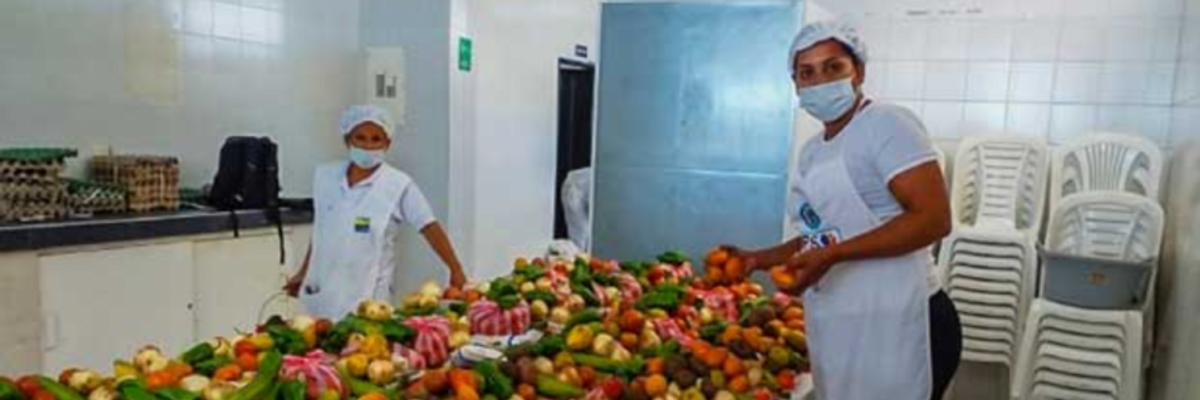This week*, the Committee on World Food Security (CFS) is expected to endorse recommendations on agroecological and other innovative approaches for sustainable food systems, after an intense period of negotiation involving governments, UN agencies and institutions, Indigenous People's organizations, civil society, and the private sector.
As they do so, they must also take a stance against the creeping co-option and "greenwashing" of agroecology and uphold the social and political foundations of agroecology. It is these inherent characteristics that are so crucial for the deep structural transformation of global food systems that we so urgently need.
Support for the industrialized model of food and agriculture--which is premised on a mindset that commodifies food, externalizes its true environmental and social costs and is upheld by short-term, unambitious policies and funding streams--needs to change.
As a vital science, practice, and movement, with inextricably linked ecological, social, and political elements, agroecology is gaining more acceptance globally. From our work convening food systems actors working in agroecology, regenerative agriculture, and Indigenous foodways, coupled with the launch of recent studies on the need for investment in agroecology and this review on agroecology's contribution to food security and nutrition, we know the evidence clearly supports it as a transformative approach.
In particular, agroecology combines ecological principles of diversity, resilience and recycling (for example) and the co-creation of knowledge, contextual factors like culture and tradition with responsible governance and the importance of circular and solidarity economies.
Yet, there is an emerging and real risk that agroecological messages, approaches, and methods are being cherry-picked and absorbed into the public narrative without recognition of the deeply transformative elements that define agroecology and how they lead to a healthy and sustainable future of food for all.
COVID-19 has been a brutal demonstration of what goes wrong when we do not recognize the deep interconnections between human, animal, and ecological health. It has disrupted food systems--and subsequently people's livelihoods and health--on a global scale and, unlike anything before, has called into question the unsustainable and vulnerable industrialized food systems currently at play.
Support for the industrialized model of food and agriculture--which is premised on a mindset that commodifies food, externalizes its true environmental and social costs and is upheld by short-term, unambitious policies and funding streams--needs to change.
The industrial model marginalizes the world's majority food producers--smallholder farmers, food provisioners and workers, Indigenous Peoples, and their innovative solutions, while causing far-reaching and detrimental environmental impacts. It is estimated that food systems account for approximately 30% of global emissions.
The pandemic recovery moment cannot be left to pass and instead must be harnessed as a moment for real change.
There is a growing diversity of voices and communities from around the world laying claim to agroecology's transformative effects: 600,000 farmers in Andhra Pradesh, India, are transitioning to natural farming with support from the state government working in partnership with civil society organizations, while other countries like Costa Rica, Senegal, and Germany are setting meaningful targets and transitioning their support towards agroecology and organic agriculture.
There are increasing numbers of local, regional, and global farmers' networks advocating for this approach. This is all happening even in spite of the fact that most agriculture and food subsidies, policies and programs, and donor activity, are still geared towards shoring up an industrialized model of food production.
With the UN Food Systems Summit and COP26 just a matter of months away, it's never been more important to embrace systems-based approaches and protect all that they stand for. In order to unlock the real benefits of agroecology, we need to see adapted policies, public investments, institutions, and research that promote a whole-systems approach and the advancement of agroecological and regenerative approaches that embed social and political principles.
Decision-makers must, from the get-go: acknowledge the strong role that local institutions and communities have; protect and expand rights, investment in infrastructure; and, embrace the central role of smallholder farmers, Indigenous Peoples, and women.
Crucially, this will involve actively resisting the rise of so-called "junk agroecology" and, concurrently, widening the frame of the evidence used to influence and inform decision-making.
A narrow focus just on scientific evidence (though critically necessary) at the expense of other types of evidence, diverse perspectives, and ways of knowing will only continue to jeopardize our understanding of the interconnected challenges we face and hold us back from mobilizing around the transformative opportunities across our food systems that are readily available--and within reach.
This is an urgent call to action.
*The Special Session of the 48th Plenary of CFS will take place virtually on Friday, 4 June 2021 to endorse the CFS Policy Recommendations on Agroecological and Other Innovative Approaches. The endorsement of the Policy Recommendations was moved from CFS 47 (held in February 2021) as their negotiations and completion was delayed due to COVID-19.

